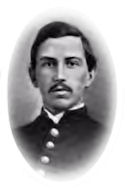From midnight, until 4 A. M., the movement of troops continued; till at last we were the only brigade left on the field. General French finally concluded his brigade had been forgotten, through somebody’s negligence, and reluctantly gave the order to fall in and follow the crowd. We stepped out, and soon overtook the retiring column, which was spread out on either side of the road, marching without much order and apparently indifferent to discipline. It rained a little during the night, and about daylight poured down in torrents, turning the roads into streams, and fields into sticky mud, making the marching execrable. Many of the batteries were obliged to double their teams on the guns, at certain places on the road, and only succeeded in getting them along by the greatest exertion. In the course of the day we passed several guns deserted in the road, and later on a siege battery, which effectually blockaded the route. The ground was slippery, the men fatigued, and everybody disgusted, which must have accounted for the great disorder. It really began to look like another Bull Run, and when a detachment of pioneers came up the road, and began felling trees across it, directly in front of the moving train of wagons, and artillery, we concluded some one must have gone crazy, and in sheer despair gave up thinking at all. When the battery commanders expostulated with the pioneer officer, he said he had his orders from the chief of staff of the army, and must obey them. The result was all the wagons and guns in rear of the obstructions, had to be hauled up the side of the road, and move in the fields, which was an immense and unnecessary labor. Our brigade marched in the fields in good order, without instructions till 4 P. M., when one of Sumner’s staff came along, and was surprised to learn we had been forgotten. He told us we were bound for Harrison’s Landing, where the army would remain and entrench itself. That Turkey bend, the position about Malvern Hill, was considered too weak to hold. The river was too narrow for the operations of the gunboats, and there was no natural protection on our right flank. Consequently, Harrison’s Landing had been selected as an ideal position. It seems the general commanding never thought of following up his success, which is the most curious thing, as almost every one else belonging to the army thought it a matter of course. Very shortly after the interview with this staff officer, we were directed to file off into a piece of shrub oak, and there pitch our tents for the night, until the storm subsided. The men were covered from head to foot with mud and made a miserable appearance. The army of Flanders was noted for its swearing, but I should like to back this army, on this particular occasion, against it, and give odds to boot.
Everything was disagreeable; the ground low and almost covered with water, the bushy trees dripping from every leaf and branch and the men thoroughly soaked to their waist in water. It was nearly eight o’clock before the brigade was wholly under cover, and resting from its efforts of the past six days.



